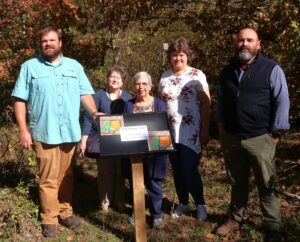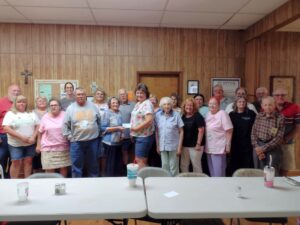GREENEVILLE – Another donation from the Greeneville Woman’s Club will support further development of the Tusculum University Nature Trail with the incorporation of educational components that will enhance the user experience.

Left to right, Jordan Baker, Vivian Gibbons, Pat Barnett Kim Carter and Dr. Peter Noll celebrate the Greeneville Woman’s Club’s $500 donation to purchase two more signs for the Tusculum University Nature Trail. Tusculum University photo
The club recently contributed $500 to purchase two more signs for the trail, which runs between the Doak House Museum and the Paul E. Hayden Educational Wetland. These signs will be placed along the trail as part of the new education initiative. This newest gift comes a year after the club provided the money for the initial signage, which was placed at the wetland and the Doak House.
Representatives of the club and the university recently held a sign presentation ceremony on the trail.
“We feel it is so important to maintain environmental standards in universities,” said Vivian Gibbons, chair of the club’s environment department. “The more people who are raised and encouraged to appreciate the natural world, the better off we all are. We try to respond to current needs, and what we learned from Tusculum was that assistance with signage for the trail would be beneficial. The signs help increase awareness of the trail and demonstrate that Tusculum values nature.”
Pat Barnett, one of the department’s members, said the Greeneville club and the General Federation of Women’s Clubs to which it belongs are focused on getting people to visit natural settings. In addition to the trail signs, the local club has also been interested in providing signage for Tusculum’s Level 1 arboretum, she said. The club was happy to find a way it could partner with Tusculum and anticipates further collaboration.
Barnett said the trail brings value to the community.
“So many people now are wanting to get out into nature,” she said. “As a former school teacher, I’m extremely interested in getting kids out in nature. Anything that we can do to make it easier for them to go along the trail and understand some of the things they are seeing was really important to us. You miss a lot if you don’t interact with nature, such as life skills and seeing how things grow and change.”
The signs Tusculum will install with the club’s donation will contain more than just basic directions. They will also have interactive materials, such as art and stories that are interchangeable. The different media will be placed under acrylic.
Jordan Baker, assistant professor of biology, said this will enable multiple academic programs and other areas of the university to use them. For example, the Education Division could place stories created by students on the signs, or the art and design program could showcase nature photos and paintings. In the case of art, that would enable a person to enjoy that medium but experience it in a nature setting as well.
“It’s designed to be multipurpose in terms of the type of media that can be placed on the signs,” Baker said. “Flexibility will be key. Recognizing how a trail is flexible because of the way nature changes, we want to be flexible in the way we adapt these signs to the different types of subject matter we want to place on them. We can adapt to what best fits for the experience.”

Kim Carter, center (wearing shorts), from Tusculum University accepts a donation from the Mt. Pleasant Ruritan Club. Photo from the Mt. Pleasant Ruritan Club
Dr. Peter Noll, professor of public history and museum studies, said Tusculum hopes to obtain additional signs so the university can create attractions such as a children’s storybook trail, content about trees, a trail of poems or an interpretive trail.
Kim Carter, science laboratory assistant, chemical hygiene officer and Environmental Protection Agency coordinator at Tusculum. envisions this signage could be helpful to Doak Elementary School, which is located adjacent to the university. If a teacher wants to bring his or her students to the trail, Tusculum will have a ready-made lesson available for the class through the signage. That way, the class can come at its convenience to visit and learn rather than be limited to times when someone from Tusculum is available.
“This will provide the university with an opportunity to develop further connections with younger children in the community,” Carter said.
In addition to the Greeneville Woman’s Club, the Mt. Pleasant Ruritan Club and one of its members, Krys Bernard, donated to the signage project. Their funds will be used to help buy Plexiglas and wooden posts to install the signs.
The trail, which is about a mile round trip, is open during daylight hours every day of the year to the community and all Tusculum family members. The university has reopened the trail after cleanup and repairs following Hurricane Helene.
Anyone who would like to donate for additional signs on the trail can email Dr. Noll at pnoll@tusculum.edu or Baker at jbaker@tusculum.edu. More information about the university is available at www.tusculum.edu.


